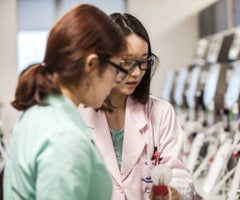MI SELECCIÓN DE NOTICIAS
Noticias personalizadas, de acuerdo a sus temas de interés

Samsung’s foray into the U.S. biologic-drug market is proving tougher than expected in the face of strong resistance from established pharmaceutical companies.
Christopher Ko, the chief executive of the South Korean conglomerate’s drug-development arm, said in an interview that its biosimilars, or cheaper versions of branded biologic drugs, have faced an uphill climb unseating incumbents in the U.S., even though those companies’ main patents are expiring.
Branded makers of biologic drugs have succeeded in holding off new entrants such as Samsung Bioepis Co. by signing exclusive contracts and offering rebates to insurers, health-care providers and other payers, said Mr. Ko. The company entered in the U.S. market in July 2017 with a highly similar version of Johnson & Johnson ’s blockbuster rheumatoid-arthritis drug Remicade.
Another hurdle has been convincing doctors and patients that the cheaper biosimilars, which are near-replicas of branded biologic treatments, can work as well as the original, he added.
“It’s been [a] much longer journey than we expected,” Mr. Ko said.
U.S. regulators could approve Samsung’s near replica of Roche Holding AG’s Herceptin as early as next week. If approved, the breast cancer treatment would be Samsung’s second biosimilar in the U.S., though the drug’s commercial launch faces legal challenges.
Samsung Bioepis is privately held and doesn’t report product revenue. The company has earned about $1 billion in revenue since 2016 from two of its drugs in Europe, according to Biogen Inc. The U.S. drugmaker, which markets the pair of treatments, owns a 49.9% equity stake in Samsung Bioepis. Biogen made the disclosure Monday at a health-care conference in San Francisco.
Samsung’s entry into the U.S. drug market is closely watched because biosimilar treatments have faced slow adoption in the country despite expectations of savings to the U.S. health-care system. Unlike generic pills, biosimilars can’t be easily switched in because they aren’t identical to the branded versions they aim to replace. Regulatory morass and lawsuits among drugmakers have also slowed uptake.
The Samsung-developed rheumatoid-arthritis drug, called Renflexis, is one of just seven biosimilars currently sold in the U.S.
Biologic drugs, such as Remicade or AbbVie Inc.’s Humira, the world’s best-selling drug, are made out of living cells and treat complex diseases including cancer and arthritis. Treatments can cost each patient tens of thousands of dollars a year-if not more, making them one of the most lucrative segments of the drug industry.
The FDA has approved 16 biosimilar products-including a record seven in 2018. Last month, the FDA unveiled additional plans to boost competition by providing greater scientific and regulatory clarity for biosimilar firms.
FDA Commissioner Scott Gottlieb has criticized tactics taken by the makers of brand-name biologic drugs, referring to “patent thickets” which are “purely designed to deter the entry of approved biosimilars.”
Mr. Gottlieb has frequently said that although just 2% of Americans use biologics, the treatments represent roughly two-fifths of the country’s annual drug spending.
A J&J spokeswoman said U.S. adoption rates for near-replica versions of Remicade have mirrored the broader biologics industry and have led to lower drug prices. “It’s clear the market is working,” the J&J spokeswoman said. An AbbVie spokeswoman declined to comment.
World-wide sales of biologics totaled $271.8 billion in 2018 and are expected to rise to $290 billion this year, according to EvaluatePharma, a provider of pharmaceutical market data and analysis. Revenue is expected to hit $436 billion in 2024.
Mr. Ko, who has a Ph.D. in molecular genetics, helped identify new business ventures for the Samsung conglomerate before being named CEO of Bioepis when the South Korean firm was founded in 2012. Samsung is betting big on biotechnology as a way to diversify beyond electronics. In August, the conglomerate’s nascent biopharma efforts were one of four areas earmarked for $22 billion of new investment through 2020.
Samsung Bioepis has two biosimilars under review with the FDA that treat rheumatoid-arthritis and breast cancer. Samsung has four biosimilar drugs for sale in Europe.
Mr. Ko is hopeful a deal struck last year with the U.S. Department of Veterans of Affairs, where Renflexis will be supplied by partner Merck & Co., could help boost local sales and build trust among American doctors and patients.
“We haven’t given [health-care payers] any reason to spend a lot of time thinking about biosimilars yet, though as the number of products goes up, I think those payers will get more interested,” Mr. Ko said.
On Monday, Samsung Bioepis said it was expanding into mainland China, announcing a licensing agreement with Chinese biotechnology firm 3SBio Inc.
Samsung says more than 100,000 patients around the world are currently treated by its biosimilar treatments, with more than 6 million doses administered.
Samsung Bioepis pursued an initial public offering at the end of 2015 but pulled back because of souring market conditions. Mr. Ko, during the interview, said he wouldn’t rule out going public in the future though had no clear timeline. “We are aware of the fact that an IPO somewhere down the line could be an attractive alternative to raise new capital,” he said.
By Timothy W. Martin
El gobierno venezolano suspendió a mediados de febrero de este año las actividades de la Oficina Técnica de Asesoría del Alto Comisionado de Naciones Unidas para los Derechos Humanos
Esto limita a la capacidad del Gobierno peruano de aplicar políticas a favor de la inversión y expectativas de crecimiento comercial
El S&P 500 cayó 1,3%, extendió su caída de abril a medida que los datos alimentaron el nerviosismo por la "estanflación"